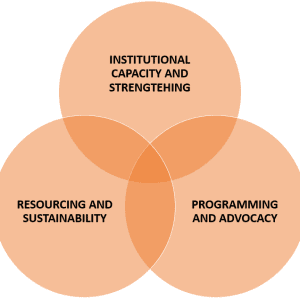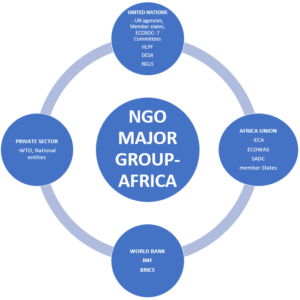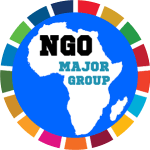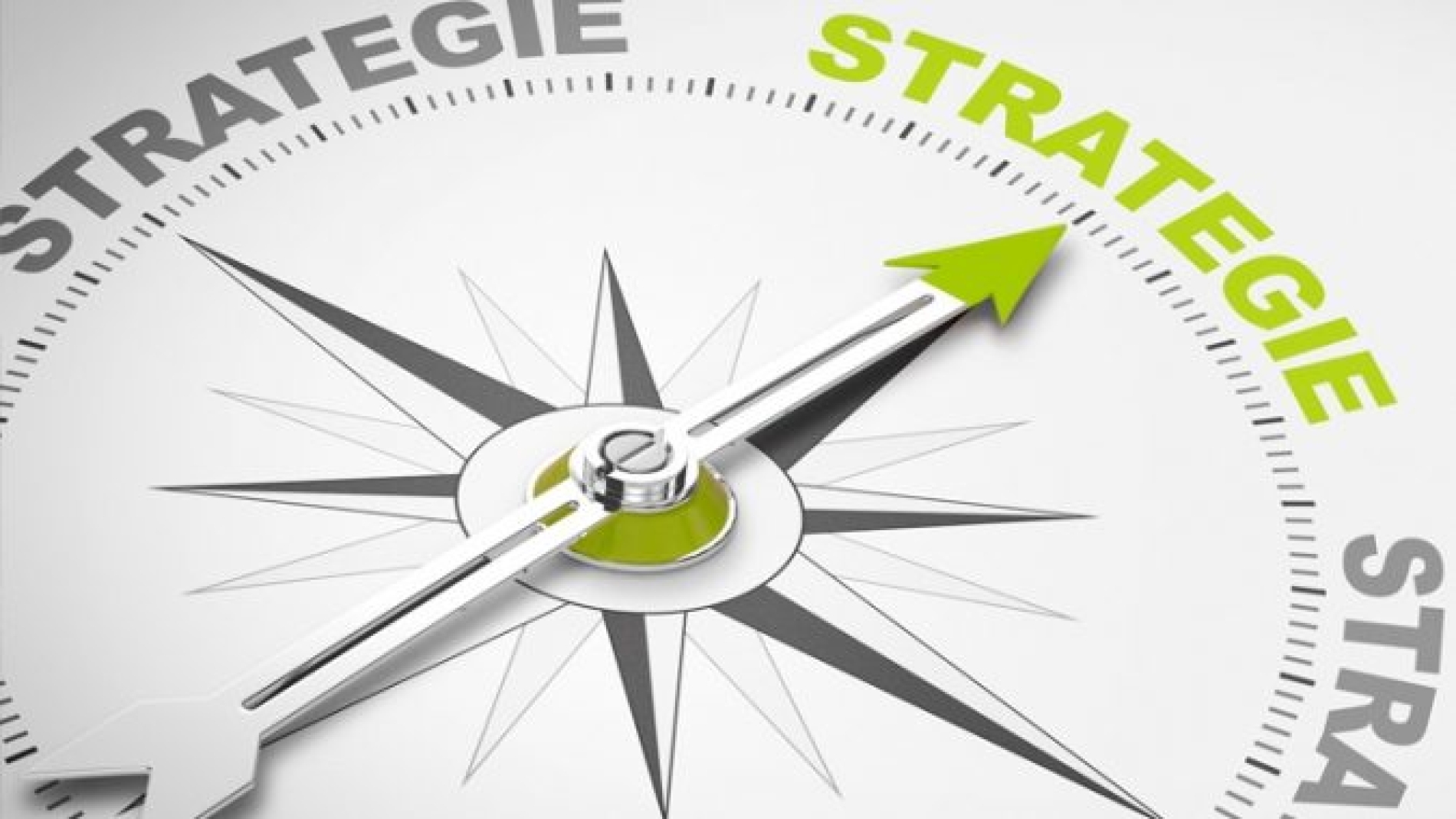NGO MAJOR GROUP-AFRICA
STRATEGIC PLAN 2018-2020
- CONTEXT TO THE STRATEGIC PLAN
1.1 History of the NGO Major Group for Africa
Engagement of Civil Society with the United Nations system has been ongoing for several years now. However the Commission on Sustainable Development strengthened this engagement when an agreement was reached by member states to establish civil society engagement under the Major Groups Clusters. This engagement was reaffirmed and expanded in the Rio+20 Outcome Document, with the Major Groups now including other stakeholder Groups such as Persons with Disability, the aged and Volunteer Groups.
The 2030 Agenda for Sustainable Development, in line with Commitment a made in Rio, allowed a self organizing mechanism for the Major Groups with the support of DESA. The NGO Major Group[1], in line with this principle of self organizing, created Regional Organizing Partners engagement framework to represent regional issues while also acting as a shared leadership and learning platform for the NGO Major Group.
Africa requested the NGO Major Group membership to be allowed to elect sub-regional representations.
Between July 2017 and January 2018 a consultative process of nominations to the Africa NGO Major Group Representation was conducted, with both DESA and the Global NGO Major Group accepting to support the process. This done through an open call to all the over 800 accredited NGOs as well as all NGOs that had over the years expressed an interest or engaged with the Global NGO Major Groups. The call was also sent out to regional civil society networks across Africa. This led to the nomination and later an appointment of five Representatives to the Africa NGO Major Group, as well as the agreement to have the MENA Regional Representative and some NGOs with knowledge of the CSO engagement, observer status.
In March 2018, the NGO Major Group for Africa met formally for the first time in Cairo, Egypt and agreed on a strategic framework as well as Governance and Institutional structures.
2.0 NGO MAJOR GROUP – AFRICA
2.1 VISION
In line with the UN 2030 Agenda for Sustainable Development, Africa Union Agenda 2063 and aspirations of the citizens of Africa, the NGO Major Group for Africa seeks to see a vibrant Africa -rooted and actively engaged Civil Society, working collectively and in partnership with African Governments and other development partners for an inclusive and sustainably developed continent.
We see our role as that of catalysts, mobilizers and partners of the Africa peoples and governments. We also see ourselves as faithful representatives of the voice of citizenry, offering space and platforms for citizens’ voice to reach and influence United Nations Development Agenda at all levels. In this regard, while we acknowledge the role of the Sustainable Development Process, we see our citizens making impact across the entire United Nations systems, including, but not limited to Member States, Regional and other Intergovernmental blocs, United Nations Organs and its various General Assembly Committees, and the United Nations Agencies.
2.2 MISSION
We will seek to effectively mobilize, support and engage Africa CSOs and its stakeholders to influence the Political and Development agendas of the AU and UN.
This vision and Mission is guided by the understanding that Africa is by far the most affected by decisions and processes at the United Nations. We are also the most in need of collaboration and partnerships, considering the vast number of issues facing the continent, the multiple UN actors on the continent as well as the presence of several facets of Civil Society.
3.0 CONTEXT TO THE STRATEGIC PILLARS AND OBJECTIVES
In developing the core focus areas for the NGO Major Group for Africa, it was acknowledged that Civil Society across Africa do not have multiple representations across various UN Departments and systems. The NGO Major Group for Africa will therefore play a larger role beyond engagement with the Sustainable Development Agenda. The UN General Assembly, for instance, has established seven committees including:
- United Nation’s Economic and Social Council (ECOSOC) a United Nations’ platform deliberates on sustainable development,
- United Nation’s General Assembly committee on social, humanitarian affairs and human rights issues also called the 3rd Committee ,
- United Nation’s High-level Political Forum on Sustainable Development (HLPF)
- United Nation’s Department of Economic and Social Affairs (DESA)
- United Nation’s Non-Governmental Liaison Service (UN-NGLS) , an inter-agency programme of the United Nations which is mandated to develop constructive relations between the UN and civil society organizations can engage with The Africa Major Group as the. All the work of NGOs falls under the 3rd committee out of the seven while the other 6 remain largely unknown.
Businesses and Intergovernmental institutions such as the World Bank also have a direct engagement space with the UN.
In order to be relevant and effectively serve Africa citizens, it is important that the NGO Major Groups engage in what is usually considered non-NGO traditional spaces, which often has direct implications on Africa’s development agenda and governance architecture.
It is also important to note that the Agenda for Sustainable Development, as well as the Africa Union Agenda 2063, are anchored on other United Nations Agreements, including, but not limited to Financing for Development, Climate Agreements, as well as UN Treaties.
We also recognize the role of partnerships with other Major Groups and Stakeholders in advancing the collective agenda for Africa. We therefore seek to leverage on these partnerships to accomplish our strategic pillars.
- GOAL
To Contribute towards the advancement and empowerment of citizens and decision /policy makers to realize sustainable development in Africa.
4.1 Strategic Objectives:
To attain the overall strategic goal, this plan will aim to achieve the following strategic objectives:
- To build the institutional capacity of the NGO Major Group for Africa and its stakeholders.
- To strengthen Africa’s CSOs voice and capacity to influence the sustainable development agenda.
- To support and influence the AU and UN reform agendas for inclusive and sustainable development.
- To promote engagement and establish linkages between African CSOs and various stakeholders for sustainable development.
4.2 STRATEGIC PILLARS
The NGO Major Group- Africa will work under the following pillars:
[1] For Full Roles and Responsibilities of the NGO Major Group, see agreed Terms ofn Reference in Annex 1

4.2.1 INSTITUTIONAL CAPACITY AND STRENGTHENING
This pillar seeks to ensure that the NGO Major Group for Africa is fully functioning and widely visible. In order to realize this objective, the following activities will be undertaken.
- Establish a Secretariat with support staff whose roles shall include:
– Help run the daily activities of the NGO Major Group for Africa;
-Provide support team for research, communication, fundraising etc;
-Host the NGO Major Group for Africa website;
- Identify national representatives in each member country across Africa.
- Develop a website, facebook for the NGO Major Group for Africa.
- Develop the NGO Major Group for Africa communications strategy.
4.2.2 PROGRAMMING AND ADVOCACY
Promote engagement and reform linkage between SCs and its institutions for sustainable development. Among the activities to be carried out under this pillar are to:
- Establish partnership among CSOs, AMG and local governments.
- Promote research and innovations for sustainable development.
- Promote reforms of AU and other UN agencies( long term goals)
- Mobilizing CSOs and think tanks to influence policy positions on SD
- undertake issue-specific researches.
- undertake outreach and advocacy initiatives.
- Conduct conferences and forums on specific development themes.
- Identify national representatives in each member country across Africa.
- Conduct capacity building workshops
- Hold engagement meetings between CSOs and government and intergovernmental bodies
4.2.3 RESOURCING AND SUSTAINABILITY
- Establish and implement a resource mobilization strategy which addresses the long term sustainability.
- To develop and train human resource for African CSOs and AMG for sustainable development.
- Support fundraising activities through partners with other organizations and network
- STAKEHOLDER ANALYSIS

Annex 1
- THE NGO MAJOR GROUP ROLE, FUNCTIONS, RESPONSIBILITIES
This strategic plan for the NGO Major Group for Africa is made within the premise of the role, functions and responsibilities of the NGO Major Group as outlined in the Rio+20 Outcome document which states:
- Role
Referring to Agenda 21 establishing the nine Major Groups9, ECOSOC resolution E/1993/207 of 12 February 1993 establishing the Commission for Sustainable Development (CSD) and giving the Major Groups a formal role, further referencing paragraph 84 of the Rio+20 Outcome Document including the UNGA resolution, 67/290, establishing the HLPF legitimizing the Major Groups system, these terms of reference provide the criteria, mandate and functions of the OPs of the NGO Major Group. The OPs represent NGOs and collaborate and coordinatedirectly with DESA/DSD as the designated secretariat for the SDGs/2030 Sustainable Development Agenda, and is hence the primary secretariat for the Major Groups.
At the UN Summit Sustainable Development Summit 2015, 2527 September, governments adopted the Declaration, “Transforming Our World: The 2030 Agenda for Sustainable Development,” on a “comprehensive, farreaching and peoplecentred set of universal and transformative Goals and targets.”11 The outcome document affirms that the HLPF “will have the central role in overseeing followup and review at the global level.” Moreover, governments are encouraged to “conduct regular and inclusive reviews of progress at the national and subnational levels,” to “draw on contributions from indigenous peoples, civil society, the private sector and other stakeholders, in line with national circumstances, policies and priorities.”
The role of the OPs will be facilitative andrepresentative. Given the number and diversity of NGOs that comprise this Major Group, OPs are expected to remain neutral, take a holistic approach by assisting and facilitating the participation of all NGOs within the NGO constituency. The role of the OPs entails assisting and facilitating participation of the NGO Major Group in the intergovernmental processes at the UN in a broad sense. Advocating for the active role of NGOs accredited to the HLPF is their overarching responsibility, as well as to protect and strengthen the space for civil society at the UN.
The NGO Major Group OP role includes a number of components, which are, inter alia, based on those outlined in the United Nations Department of Economic and Social Affairs’ “Note on Major Groups Governance” (2013):
- Consultation with NGO Major Group
- Communication, outreach and advocacy
- Resource mobilization
- Liaison with the United Nations Department of Economic and Social Affairs, in particular its Division for Sustainable Development.
- Seehttps://sustainabledevelopment.un.org/content/documents/7891Transforming%20Our%20World.pdf
- Coordination and communication with other Major Group/Stakeholder Organizing Partners & Focal Points for the HLPF and other intergovernmental bodies.
The NGO Major Group OP role also includes identification of and reaching out to new member organizations within global and regional networks, and ensuring appropriate engagement at the global and regional levels.
- Functions and responsibilities
Organizing Partners, through the Facilitation Committee, perform and have the following functions and responsibilities:
- Consultation with NGO Major Group
- Coordinate and facilitate the registration and participation of NGO representatives at the HLPF and other relevant UN sustainable development processes; be responsible for the selection of NGO speakers during the meetings.
- Develop annual ‘roadmap’ that would provide strategic direction and technical guidance so NGOs will be able to maximize their preparation and participation in all UN sustainable development negotiations and processes;
(iii)Consult with global/regional/national NGO networks to prepare written inputs to the intergovernmental process in the form of position papers and priorities for action papers addressing the themes of sustainable development under discussion, including crosssectoral themes that reflect views on progress made, outline obstacles and constraints to implementation, and identify emerging issues and new challenges;
(iv)Identify NGO expertise in the field of sustainable development and channel best practices, expert advice, and policy recommendations to relevant intergovernmental processes;
- Ensure the provision of guidance for working structures, such as thematic clusters, task forces and working groups as necessary;
- Communication, outreach, advocacy
- Provide regular updates and disseminate relevant information to the NGO Major Group;
- Develop training programs so that NGOs will be able to maximize their understanding and presence at the HLPF and other intergovernmental processes designed to implement, monitor and review the 2030 Sustainable Development Agenda and follow up of the other Rio+20 outcomes;
- Establish and maintain NGO Major Group website, Facebook, Twitter and other relevant social media platforms;
(ix)Produce an Annual Report of the activities of the NGO Major Group to be placed on the NGO Major Group website and disseminated to relevant UN agencies and all missions;
- Invite NGO communication officers to help prepare and execute media strategies as necessary.
- Resource Mobilization
(xi)In partnership with DESA/DSD, and if appropriate with other major groups & stakeholders, raise funds for travel, capacitybuilding, communications, outreach and advocacy;
- Ensure funding for the participation of selected of NGO speakers and participants that is inclusive, balanced, transparent and fair.
- Liaison with UN DESA/DSD
- Liaise with UN Secretariat, in particular with Stakeholder Engagement Programme of DESA/DSD;
- Uphold the code of conduct as stipulated by the UN and ensure NGO constituencies are aware of UN rules and procedures and protocols;
- Engage with DESA/DSD on a continual basis on planning activities, requiring timely response to emails, outreach constituencies, active leadership in the production of reports and written documents and regular attendance and contribution to Major Groups OPs monthly meetings with DESA/DSD;
- Make publicly available all reports submitted to DESA/DSD on the NGO MG & DSD websites. This should include the particulars of outreach to regional/national networks, communications, accountability practices, representation and decisionmaking processes;
- Assist DESA/DSD with outreach through active use of the Sustainable Development Knowledge Platform, Facebook and Twitter channels when feasible.
- Coordination with other Organizing Partners of other Major Groups and Other Stakeholders
Maintain regular coordination with other OPs within Major Groups and Other Stakeholders, including through the development of joint work plans, as appropriate.


